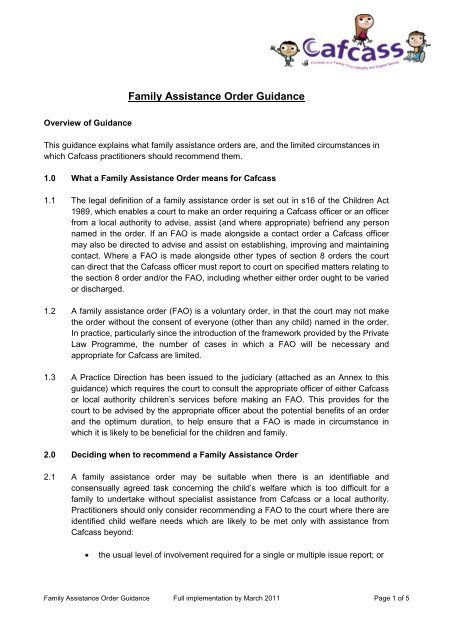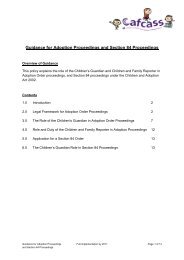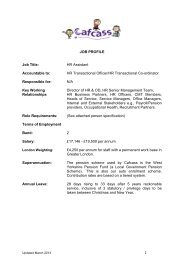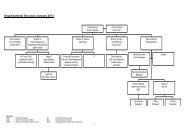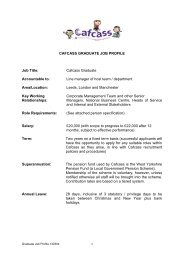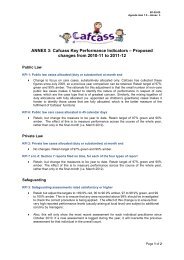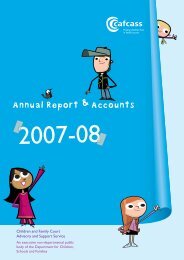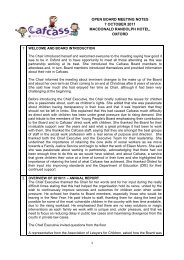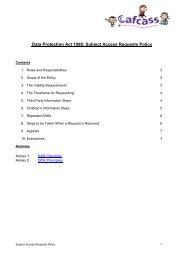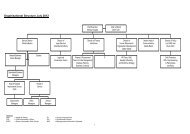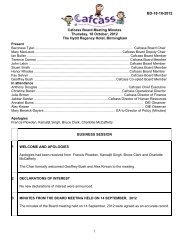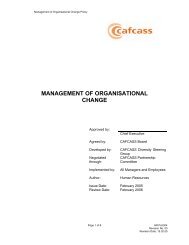Family Assistance Order Guidance - Cafcass
Family Assistance Order Guidance - Cafcass
Family Assistance Order Guidance - Cafcass
Create successful ePaper yourself
Turn your PDF publications into a flip-book with our unique Google optimized e-Paper software.
<strong>Family</strong> <strong>Assistance</strong> <strong>Order</strong> <strong>Guidance</strong>Overview of <strong>Guidance</strong>This guidance explains what family assistance orders are, and the limited circumstances inwhich <strong>Cafcass</strong> practitioners should recommend them.1.0 What a <strong>Family</strong> <strong>Assistance</strong> <strong>Order</strong> means for <strong>Cafcass</strong>1.1 The legal definition of a family assistance order is set out in s16 of the Children Act1989, which enables a court to make an order requiring a <strong>Cafcass</strong> officer or an officerfrom a local authority to advise, assist (and where appropriate) befriend any personnamed in the order. If an FAO is made alongside a contact order a <strong>Cafcass</strong> officermay also be directed to advise and assist on establishing, improving and maintainingcontact. Where a FAO is made alongside other types of section 8 orders the courtcan direct that the <strong>Cafcass</strong> officer must report to court on specified matters relating tothe section 8 order and/or the FAO, including whether either order ought to be variedor discharged.1.2 A family assistance order (FAO) is a voluntary order, in that the court may not makethe order without the consent of everyone (other than any child) named in the order.In practice, particularly since the introduction of the framework provided by the PrivateLaw Programme, the number of cases in which a FAO will be necessary andappropriate for <strong>Cafcass</strong> are limited.1.3 A Practice Direction has been issued to the judiciary (attached as an Annex to thisguidance) which requires the court to consult the appropriate officer of either <strong>Cafcass</strong>or local authority children’s services before making an FAO. This provides for thecourt to be advised by the appropriate officer about the potential benefits of an orderand the optimum duration, to help ensure that a FAO is made in circumstance inwhich it is likely to be beneficial for the children and family.2.0 Deciding when to recommend a <strong>Family</strong> <strong>Assistance</strong> <strong>Order</strong>2.1 A family assistance order may be suitable when there is an identifiable andconsensually agreed task concerning the child’s welfare which is too difficult for afamily to undertake without specialist assistance from <strong>Cafcass</strong> or a local authority.Practitioners should only consider recommending a FAO to the court where there areidentified child welfare needs which are likely to be met only with assistance from<strong>Cafcass</strong> beyond:the usual level of involvement required for a single or multiple issue report; or<strong>Family</strong> <strong>Assistance</strong> <strong>Order</strong> <strong>Guidance</strong> Full implementation by March 2011 Page 1 of 5
what can incorporated into an order for a Contact Activity condition ordirection; orany other type of parenting intervention (mediation, Parenting InformationProgramme)and where the adults who would be named in the order are likely to give theirinformed consent to it.2.2 In all cases the practitioner should, before recommending a FAO, consider whetherthere are other services outside of <strong>Cafcass</strong> (such as therapeutic interventions) whichwould be better placed to assist the family.2.3 When thinking through the suitability of a FAO it may be helpful to consider thefollowing criteria:i) Would a FAO contribute to improved safeguarding and promotion of thewelfare of the child/ren?ii)iii)Does the initial assessment indicate that the issues in dispute can beidentified, narrowed and agreed by the parents and child (subject to age andunderstanding) and given a specific focus suitable for a FAO?Does the initial assessment identify sufficient potential for parental cooperationto make a FAO appropriate?iv) In your professional judgment, are the parents/carers sufficiently able todifferentiate their needs from those of their child so as to make a FAO a viablemeans of post-proceedings intervention?v) Can practical outcomes be identified which are clearly beneficial for thechild/ren and which will only be achieved with the support of <strong>Cafcass</strong>? Forexample, helping parents to work together to better understand their child’sneeds, and support their children to adjust to changed living arrangements;helping parents to develop suitable contact arrangements and maintaining keyrelationships within their extended family networks – a FAO should only berecommended if these outcomes can only be reached with specific <strong>Cafcass</strong>input.vi) Has the child been enabled (subject to age and understanding) to expresstheir views about what s/he might like to happen in the family? Can the childplay an active part in the FAO?vii) Are there additional resources which may support the sustainability of a FAOfor this child and family? (i.e. support from the extended family, or the supportof other agencies for the child and/or family members).viii) What report, if any, might most appropriately be provided to the court at theconclusion of the order and/or during its operation?<strong>Family</strong> <strong>Assistance</strong> <strong>Order</strong> <strong>Guidance</strong> Full implementation by March 2011 Page 2 of 5
2.4. If the practitioner believes that a FAO would safeguard and promote the welfare of achild, this should be reflected in the report to the court. In some cases, where theproposal for a FAO originates from the court itself, it may be necessary to request anadjournment to allow sufficient time to assess the family and to make sure there is afull and informed agreement of the adults who are to be named in the order1. Thoughnot a statutory requirement, it is good practice to ascertain the views of the affectedchild/children about the proposed order.2.5 As in all <strong>Cafcass</strong> interventions it is important to involve the family in the analysis anddecision making process. However, in the case of a FAO this is particularly important,because an order can only be made with the consent of the adults who are named inthe order. As part of securing the adults’ informed consent to the making of an order,they should be provided with a copy of the <strong>Cafcass</strong> case plan which would beimplemented if a FAO were to be made.2.6 Before a court makes a FAO in accordance with the terms of the September 2007FAO Practice Direction (annexed at the end of this guidance) it will seek the opinionof the <strong>Cafcass</strong> officer about whether an order is in the best interests of the relevantchild/ren and if so, about the way in which it should operate and its duration.3.0 Casework during a <strong>Family</strong> <strong>Assistance</strong> <strong>Order</strong>3.1 In all cases, a FAO will be allocated to a <strong>Family</strong> Court Adviser who will act as casemanager. The case manager may carry out some of the work under the FAO him orherself, or it may be carried out by a <strong>Family</strong> Support Worker (FSW) or by anotheragency.3.2 When providing services to a family under a FAO the following practices are to befollowed:If any new concerns emerge during a FAO which gives cause to suspect thatthe child is at risk of harm, it must be brought to the attention of the casemanager immediately. The case manager must ensure that <strong>Cafcass</strong>’ responseto these new concerns accords with the <strong>Cafcass</strong> Safeguarding Framework.During the course of the FAO, it is good practice for the case manager orFSW periodically to review progress towards meeting the goals set out in thecase plan. The goals should then be revised or added to as necessary.The case plan should set out the nature of the interventions to be carried outby <strong>Cafcass</strong> and other agencies, including their frequency, duration and thelocations where the interventions are to take place.3.3 <strong>Cafcass</strong> may arrange for services under the FAO to be provided by an externalagency or agencies. A decision to refer a case to another agency for additionalservices will be taken by the case manager. The case manager or FSW may need to<strong>Family</strong> <strong>Assistance</strong> <strong>Order</strong> <strong>Guidance</strong> Full implementation by March 2011 Page 3 of 5
call a multi-agency meeting to identify how the range of services will be delivered andto clarify the role of <strong>Cafcass</strong> and other agencies in coordinating and reviewing thedelivery of services. Everyone named in the FAO should also be invited to themultiagency meeting.3.4 The case manager or FSW should ensure that the child, everyone named in the FAOand other professionals involved are aware of the exact terms of the FAO, exactlywhat work the court wants to take place under it, and of the steps the court wants thecase manager to take. The case manager or FSW should also make sure that thosenamed in the order are clear about the circumstances which may cause the case tobe referred back to the court. For example, the case manager may need to report tocourt on progress (or lack of progress) or seek a further order or an extension to thecurrent order.4.0 The conclusion of a <strong>Family</strong> <strong>Assistance</strong> <strong>Order</strong>4.1 As the order approaches its end date, the practitioner should arrange a final reviewwith the family to review what has been achieved and to identify what should bereported back to the court (if required by the terms of the FAO), what ongoing needsremain and how these might best be met, including through referral to anotheragency.OwnerPolicyIssued March 2011Version 2.0<strong>Family</strong> <strong>Assistance</strong> <strong>Order</strong> <strong>Guidance</strong> Full implementation by March 2011 Page 4 of 5
Next Review September 2012Annex 1Practice Direction 3 rd September 2007<strong>Family</strong> <strong>Assistance</strong> <strong>Order</strong>s Consultation1. This Practice Direction applies to any family proceedings in the High Court, a countycourt or a magistrates’ court in which the court is considering whether to make a familyassistance order under section 16 of the Children Act 1989, as amended (“the 1989Act”). It has effect from 1st October 2007.2. Before making a family assistance order the court must have obtained the opinion of theappropriate officer about whether it would be in the best interests of the child in questionfor a family assistance order to be made and, if so, how the family assistance ordercould operate and for what period.3. The appropriate officer will be an officer of the Service, a Welsh family proceedingsofficer or an officer of a local authority, depending on the category of officer the courtproposes to require to be made available under the family assistance order.4. The opinion of the appropriate officer may be given orally or in writing (for example, itmay form part of a report under section 7 of the 1989 Act).5. Before making a family assistance order the court must give any person whom itproposes be named in the order an opportunity to comment upon any opinion given bythe appropriate officer.6. Issued by the President of the <strong>Family</strong> Division, as the nominee of the Lord Chief Justice,with the agreement of the Lord Chancellor.The Right Honourable Sir Mark PotterPresident of the <strong>Family</strong> Division and Head of <strong>Family</strong> JusticeSeptember 2007<strong>Family</strong> <strong>Assistance</strong> <strong>Order</strong> <strong>Guidance</strong> Full implementation by March 2011 Page 5 of 5


